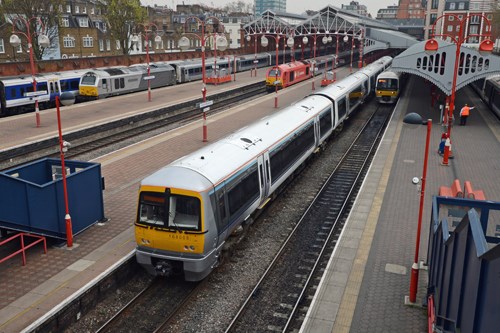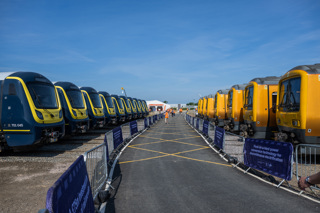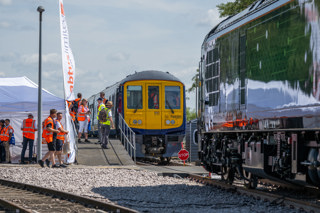Hidden away at London Marylebone, as you walk through the archway off the station, is a small door. This is the entrance to Chiltern Railway’s headquarters.
It’s perhaps fitting that this small door is so unassuming, because Chiltern doesn’t really seem to attract many headlines - it simply gets on with its work.
Granted, it claimed the Operator of the Year prize at RAIL’s National Rail Awards in 2012, and there is infrastructure work in place to re-open railways, but its performance rarely makes the headlines, as it is consistently good. Its management team rarely changes, and it is a long-term franchise (first awarded in 1997, and due to finish 25 years later in 2022).
The market is a challenging one, yet there is a perception that Chiltern’s performance is good because the line has, for the main, just one operator. Managing Director Rob Brighouse contests this.
“There’s a myth that Chiltern Railways is simple. We use the same route as CrossCountry, First Great Western, London Midland, Freightliner, Direct Rail Services, Colas Rail and GB Railfreight. They all use it.”
Chiltern has cultivated a working agreement with Network Rail that is producing great benefits. NR West Midlands Area Manager Liam Sumpter has only been in the role for six months, but already he and Brighouse have struck up a relationship where they seem to know exactly what the other wants.
Brighouse explains: “Some time ago we put together a collaborative agreement. In terms of putting it together, basically it is a way to tackle issues. But our attitude is: if we cannot sort it out over a coffee, what’s the point?”
Sumpter interjects: “I am not pretending we agree 100%. When we don’t agree, we chat and speak on the phone. But there has never been something where we have to disagree.”
Brighouse backs this up. “Liam wants our passenger trains to run on time. You miss the key thrust if you think he only wants the infrastructure to work.”
This attitude has required a culture change from within the NR staff, as well as from Chiltern. Says Sumpter: “We have done a lot to change the culture. If you talk to my team throughout the organisation, they are all passionate about the railway and what it does. So really this is allowing them to exploit it.”
But what drives Chiltern? It’s all very well working with Network Rail, but what about the passengers - after all, that is what Chiltern Railways is about, surely?
Brighouse says: “I think to me, passenger satisfaction sits at the top. The National Rail Passenger Survey shows we are the highest franchise. What drives that is good performance.”
He is also passionate about safety. He listens to Sumpter explain about a joint focus, and says: “Safety and productivity go hand in hand. I want people to go home safely.”
Sumpter had been speaking about the challenges facing NR on his patch: “We have a joint focus on safety. You would expect that working for Network Rail, but Rob and his team challenge us on it. We are challenged on level crossings and workforce, too. We have visited a possession at Haddenham and Thame Parkway together, and we are both very passionate about that. You may not think that, but we are. It is the basis for sound performance. If they work safer, they work better.”
Adds Brighouse: “I am working for the Rail Delivery Group on efficiency of engineering work on rail. We are driving safety and productivity, and these are linked. I have seen things that could change the industry. Safe teams are the most proactive and productive.”
How teams can improve safety requires different methods of working, according to Sumpter.
“It is about being ready to start when you have a possession. It is about having things ready. It is a whole lot of onsite activities. It is about how you maximise access to the railway.
“It may or may not be more efficient. We have Banbury resignalling next year. We are trying to push boundaries. Could we do weekend nights? We have looked, and probably cannot do Banbury on weekday nights.”
But the key thing here is that NR is considering the possible options -Sumpter is clearly trying to change the mindset.
Brighouse says: “That is why it is an industry collaboration. Banbury is too soon, but how can we flex the service? I worked in Hong Kong, and there it was running 20 hours a day, seven days a week. We only had four hours. I think that could work wider than in Chiltern.”
It helps Chiltern that Brighouse worked on the infrastructure side of the railway for 15 years. He tells RAIL: “I think the beauty of the partnership is that Liam gets the railway. I worked there for 15 years, and I know what we are on about. It is not me thinking passenger trains and him infrastructure. We sit in on each other’s team meetings. Liam can challenge me on rolling stock performance. These meetings are tough - don’t go thinking they are easy. Being challenged offers a fresh perspective.”
But it hasn’t been plain sailing. The National Passenger Survey satisfaction figures dropped just after CR won its National Rail Award. There have also been suggestions that the rolling stock, at times, has not been as reliable as it could be. The Class 67s and Mk 3s have been known to fail, for example. Brighouse acknowledges this: “When we commissioned the frequency improvements, performance dipped. It was partly infrastructure, and partly performance and regulation.”
Sumpter, sitting next to Brighouse, agrees: “We refreshed the performance groups. The challenge is the 94% public performance measure (PPM). We delivered that, but people were not happy.
“I will read the Twitter feed during disruption. People are not happy - that is the challenge. There is ranting, but if that is from the heart then the challenge is to challenge that. We delivered 97.8% PPM recently.”
A few years ago, one former managing director told RAIL that an operator could never reach 100% PPM. Brighouse challenges that perception:
“Why not? I worked in Hong Kong and delivered 100% PPM for 30 days! It’s about working on culture. The British Transport Police and Network Rail are involved. We focus on how to deliver to a customer who doesn’t care how you deal with disruption. They need to know what is happening.”
Says Sumpter: “It is about the art of the possible. 98% PPM? Why not? Why not go for it? For the first time, we are asking what is possible.
“There is a Moving Annual Average (MAA) of 94.5%. How many more trains per day are there? Twenty? That’s all it needs to get to 98%. Remember, in CP4, 15% more trains were added to the route. Why not achieve that MAA before the end of CP5 in 2019?”
In conjunction with Aston University, work is being carried out looking at how to deal with passengers, and how Chiltern can communicate better with its users. It’s about understanding from the moment it goes wrong, and about smoothing that process.
Brighouse says the focus at CR is different, with the emphasis on getting information out. He says the operator needs to focus on steady statements through information, but asks the question: who delivers the communications?
“The philosophy is about making sure we do the right thing,” he says. “It’s all very well having a plan, but the passengers need to be able to understand it.
Sumpter points out: “No plan survives first enemy contact,” using a phrase from 19th century German military strategist Helmuth von Moltke.
There are upgrades taking place on the line. As part of the Evergreen 3 project, trains will run from Oxford to London Marylebone from next year. There are ambitions to run on the Cowley Bridge route, while East-West Rail will also cross Chiltern’s route.
Brighouse says: “So we have upgraded the route. The project manager was Paul Hudson, and he worked for Network Rail. He was the best I worked with.”
Sumpter explains: “I have the delivery unit. It is the best for asset delivery. They look at the reliability, and we have a Chiltern Railways representative. They attend and ask questions. We have a way of doing things that needs to be refreshed.”
It’s not all one-way, however - it’s not simply a case of Chiltern Railways constantly sitting in on Network Rail meetings and telling the infrastructure company what to do.
Brighouse explains: “It works the other way. My performance executive John Salmon attends and works for Network Rail. We never carve up meetings. My guys have forgotten he works for Network Rail.”
According to Brighouse, the reason Salmon gets out of bed is to look after the route: “It is tremendous to have his care. We had a major operating incident at Willesden Green once. He came back and helped. It would have been easy to go home, but that approach is indicative.”
Sumpter chips in: “That shows the collaborative approach. When there was a fire at Marylebone, I had six or seven members of the top team offering to help Chiltern Railways staff and give information.
“We can show them what to do. Anyone can. What is impressive is that people want to do this. Telling people isn’t a sustainable model. You have to get the culture, and you need to support people. You can see the strength you have when things are bad.”
Brighouse has the desire to improve: “If you don’t aspire to get better, you only go one way. Are we happy? Never! I am pleased with the relationship, but we can challenge it and continue to get better.
- This feature was published in RAIL 764 on 24 December 2014


















Login to comment
Comments
No comments have been made yet.